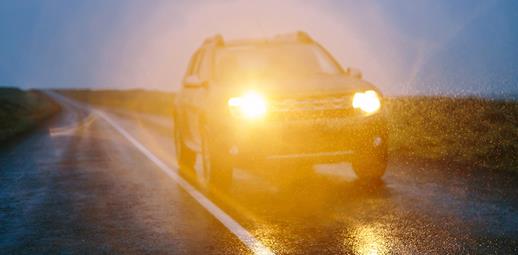
If you’ve ever been dazzled by an oncoming car’s headlights, you certainly aren’t alone.
A 2022 study by the RAC found that 89% or drivers think some or most car headlights on the UK’s roads are too bright, with 88% saying they get dazzled by them while driving[1].
The problem seems to be getting worse – nearly two thirds of drivers 63%) are dazzled more regularly now than a year or two ago, according to the study.
DO DAZZLING HEADLIGHTS CAUSE ACCIDENTS?
The most recent data published by the government shows that dazzling headlights do play a part in accidents on our roads every year.
It shows that since 2013, there has been an average of 293 accidents a year where dazzling headlights were a contributory factor[2]. Of these, six were fatal accidents.
What does the law say?
There is no law against having bright headlights in the UK, although headlights do need to meet international standards. These haven’t been updated in decades, although a review is underway. Potential changes could include introducing a maximum level of acceptable brightness.
So, what can you do to avoid getting dazzled?
Adjust your mirror
A simple step when driving at night is to flick your rearview mirror from its normal setting to the anti-glare setting. The switch is normally at the bottom of the rearview mirror, and it tilts the mirror so that, while you can still see perfectly behind you, the lights don’t seem as bright.
Some cars now come with a mirror that adjusts to the anti-glare setting automatically ‒ once it detects that the amount of light from behind you is greater than that coming from the front, it switches on, dimming any potential glare.
Keep your windscreen clean
Making sure that your windscreen is clean and grime-free, both on the inside and outside, can make a big difference to glare.
If your windows are dirty or streaky, then any light that hits the window is scattered, which can cause far more glare and impede your visibility.
See our guide for more basic winter car maintenance tips.
Talk to your optician
The dazzle from car lights can be worse if you already have problems with your eyes. If this is the case, then your eyesight may also take longer to return to normal after you’re dazzled.
You can get glasses or contact lenses with special coatings which will reduce glare, but it’s worth speaking to your optician.
Turn down your dashboard lights
It’s not just your windscreen that you need to think about ‒ if your dashboard lights are overly bright, they too can dazzle you when driving at night. As a result, it may also be worth reducing the brightness of the lights on your own dashboard.
As with windows, making sure the dashboard is clean will reduce any glare too.
Look away
It’s vital that you keep your eyes on the road while driving, but averting your gaze slightly so that you aren’t looking directly into any oncoming headlights will reduce the chances of being dazzled.
Think about other drivers
Just as you should take steps to reduce the chances of other drivers dazzling you, it’s also important to reduce any glare you might be causing.
The RAC suggests that it’s worth seeing if your car automatically adjusts its headlights based on the weight of the load you are carrying. If not, you can manually adjust them yourself by consulting the manual. That’s important because the aim of the headlight beam changes based on the weight in the car. So, if you don’t adjust it, you could be dazzling other drivers without realising it.
It’s also a good idea to be extra vigilant when driving with your own full beams on. Be sure to dip the lights as soon as you see headlights from other vehicles approaching.
No £25 admin fee
When you update your policy online, e.g. amend driver, address or car details.
Go to Solved to read more about road safety.
Original article published in August 2019; updated January 2023
[1] https://www.rac.co.uk/drive/news/motoring-news/nearly-one-in-four-drivers-think-most-car-headlights-are-too-bright/
[2] https://www.thisismoney.co.uk/money/cars/article-10589325/Are-headlights-bright-Nine-10-drivers-say-are.html

